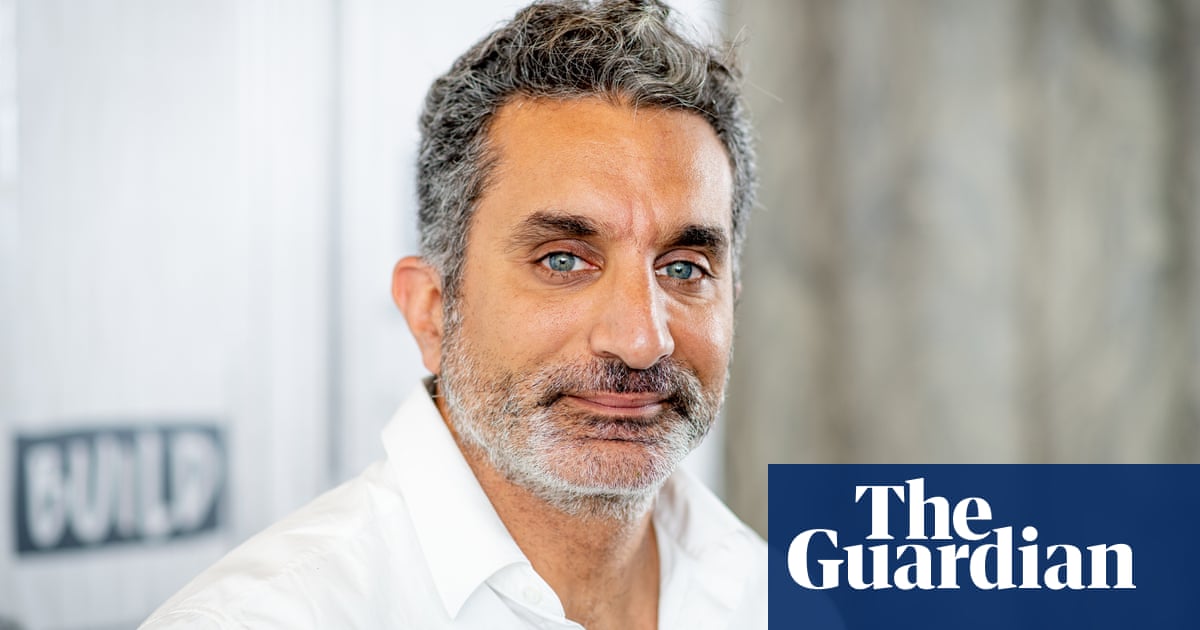
When the comedian Bassem Youssef arrives on stage for a sold-out show in Washington DC, four young women wearing keffiyehs bow their heads and begin waving their hands up and down as if he is a divine being.
The 49-year-old, who first found fame with a satirical show panning the Egyptian regime, is on the US leg of his Middle Beast tour. He is still in the afterglow of a viral appearance on Piers Morgan in October that garnered 22m views on Morgan’s YouTube channel and significantly expanded Youssef’s fan base. A two-hour follow-up was viewed 3m times within hours of its release.
Youssef opens his show with a disclaimer for the audience members who know him as the “Egyptian Jon Stewart”: “I know some of you are used to me performing in Arabic but the show will be in English, the language of the infidels,” he says.
In the show, Youssef frequently refers to Joe Biden as “Genocide Joe” – but he never directly mentions the Israel-Gaza war, which birthed the nickname. He tells me that this is a deliberate choice.
“I don’t want to be capitalizing on this right now, as it is happening. This is not the story that I want to tell. I wanted to tell my story,” he says, backstage before the show. He is digging into a bag of vegan chips and seems travel-worn. His tour expanded significantly following his Morgan appearance, adding a European leg and new US shows. In Tacoma, Washington, Youssef will perform seven sold-out shows and just added an eighth.
Youssef says he was surprised to be put on a pedestal after his Morgan appearance. “When people say ‘Thank you for speaking up, thank you for being our voice,’ that is a trigger sentence for me,” he explains.
He says this perception places too much responsibility on him. “I’m a human being and I have limitations. I cannot be someone who’s the face of that much of a cause. I do what I can, but sometimes it will be beyond my ability.”
The reverence, though, might be less about what Youssef says and more about how he says it. The 30-minute Morgan clip, for instance, is a rollercoaster ride that starts the moment Youssef appears on screen.
His answer to Morgan’s first question is a sarcastic declaration on how Palestinians “are very difficult to kill”. “I know because I’m married to one and I tried many times,” he tells a stunned Morgan. “I try to get to her, every time, but she uses our kids as human shields. I can never take her out.”
Youssef continues to use his dark humor to criticize Israel’s dehumanization of Palestinians and its military campaign in Gaza, which was still in its early days at the time.
But Youssef insists that he is ultimately a comedian. “I don’t want to be defined as an activist or a freedom fighter,” he says. “It’s not my job.”
Any tendency to define him as an activist is less about him than it is about his fans, he says. “There’s a lot of desperation and there’s people who put too much weight on people … Because their media and politicians are failing them, the expectations shift to a place that they shouldn’t shift.”
Then why did Youssef do these interviews at all?
He says he turned down Morgan’s invitation twice before acquiescing the third time he was asked. One reason, he said, is the often contradictory expectations of his dual audience.
“If I was too much, I could lose my career here in the US. If I was not enough, I would lose my career in the Arab world,” he says. “I was going in knowing it was a lose-lose situation.”
Then why put yourself through it?
“I don’t know,” he responds with a shrug. “Until now, I don’t have a clear answer.”
“Maybe it was something about seeing Ben Shapiro and his talking points,” referring to the conservative commentator, who had previously appeared on Morgan’s show defending Israel’s brutal response to the 7 October attacks. “It kind of made me mad because as he was talking, I could see the lies and I could see that I could respond to them very easily.”
For Youssef, taking risks is part of his creative and political DNA.
In 2011, when the mass protests that would topple Egypt’s longtime dictator Hosni Mubarak consumed Egypt, Youssef was a heart surgeon with a wife and toddler. Between surgeries, he filmed short YouTube videos from his laundry room that poked fun at the state media’s portrayal of protesters as foreign agents and paid stooges. The clips racked up millions of views and landed Youssef the TV deal that would make him a household name in Egypt.
Al-Bernameg – The Show – marked the first time in Egypt that satirical comedy was publicly directed at the government on a major TV channel.
It wasn’t always sophisticated humor. His most famous bit was mocking the former president Mohamed Morsi’s outfit – a graduation robe and cap he wore while accepting an honorary doctorate.
The show was huge in Egypt, watched by 40% of the country, according to the documentary Tickling Giants.
But this freedom to poke fun would not last.
In 2013, a military coup removed Morsi, who was democratically elected after the revolution. The next year, a general named Abdel Fattah el-Sisi took power. Youssef was forced to cancel his show and flee the country, risking arrest or worse if he stayed.
Sisi still rules Egypt today.
Since leaving Egypt, Youssef and his family have lived in Los Angeles. He became a US citizen in 2019.
On stage, Youssef casts Donald Trump as an autocrat and does a surprisingly good impression of a confused Biden.
“If you want my opinion, fuck both of them,” he tells the crowd with a flick of his hand.
Youssef has said that he won’t be “blackmailed” into voting for Biden. So I ask about his thoughts on the liberal counterpoint to that position – that not voting for Biden hands the presidency to Trump. It’s an argument that’s recently been directed at the sizable Arab American population in the key swing state of Michigan, which, according to polling, plans to abandon Biden in 2024 over his handling of Gaza.
“I don’t know why they’re going to the smallest minority in the country and shaming it,” Youssef responds.
“If you are the party that stands up for minorities and for human rights and for ‘peace and love and morality’ and then you supported this horrible genocide happening right now, how do you expect me to give you my vote? Because I’m afraid of the other guy?”
When Youssef came to the US in 2014, he found himself having to start over with a family to provide for.
“When I arrived in Los Angeles, I was in a small two-bedroom apartment. I didn’t know what to do. It was kind of a fall from grace,” he says. “Coming from Egypt you’re the No 1 star, and then you come here and you’re nobody.”
Recalibrating his career also meant learning how to do standup comedy in English. Today Youssef commands the stage – but he says that wasn’t always the case.
“When you start standup comedy, you are bad, of course. People come to see you and they get disappointed and you are doing it with people half your age,” he says.
“It was very, very challenging psychologically and it was humbling.”
But he credits this period of craft-building and quiet reinvention with preparing him for the onslaught of attention he’s been experiencing since the Morgan interview.
“I feel very grateful for that experience, because if that kind of blowup happened to me a year or two years ago, I never would have been ready because I wasn’t as good,” he says.
Youssef’s virality may also be representative of a shift in popular opinion here in the US. Clips of his appearances over the past four months have been widely shared on TikTok. Young people seem particularly interested in an alternative perspective on the war, as reflected in polls showing that 18-to-25-year-olds are more sympathetic to Palestinians and more likely to have an unfavorable view of Israel than older Americans are.
The morning after our interview, Youssef is in the news after telling the commentator Dean Obeidellah that he lost a role as a villain in the forthcoming James Gunn-directed Superman: Legacy movie.
Though the official reason is a script change, Youssef found out around the time of the first Morgan interview and felt that his political commentary had something to do with the decision. Sources close to the production quickly responded, telling Variety that no formal offer had been made and that the character had been written out prior to 7 October.
Youssef responded on social media, framing it all as a misunderstanding and explaining that Gunn had personally called him to clear things up. But he said his initial conclusion was not unreasonable given the storm caused by the Morgan appearance.
It’s hard to know what exactly happened, but it is undoubtedly difficult for someone like Youssef to sustain a career in Hollywood.
Given the risks that come with talking publicly about the Israeli-Palestinian conflict, it is no surprise that audiences are thrilled to see Youssef venture into the proverbial gladiator pit – and not only make it out alive, but with his career renewed.
Perhaps he knows that if he fights clean and makes his time in the arena funny, entertaining and fresh for those of us watching in the stands, he can dictate the rules of the game.
And a part of him seems to enjoys toying with activism even if he doesn’t want the label.
At one point during his show Youssef turns to the crowd and says: “We can all agree that Israel is a piece of shit.” The crowd cheers in agreement.
He follows with a sharp turn: “Your excitement is troubling. This is a comedy show, not a rally.”
It’s a dance that – as the Morgan interviews show – sometimes throws the crowd off balance. And it keeps us wondering what he’ll say next.












